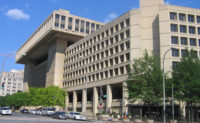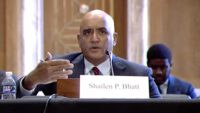A key Senate committee plans to review the decision by the U.S. General Services Administration and Federal Bureau of Investigation to halt a plan to build a new FBI headquarters in suburban Washington, D.C., via a land swap with a developer.
GSA and the FBI, citing a $882-million federal funding shortfall, announced on July 11 that they were canceling the plan, which has been in the works for years.
But Senate Environment and Public Works Committee Chairman John Barrasso (R-Wyo.) said at a July 12 meeting of his panel that he planned to hold a hearing on the GSA-FBI action.
Barrasso said, "This has been a project a long time in the making and to just abandon it that way, without ever coming to the committee or to others … specifically with the amount of money that would be wasted by making that decision the way they did, is something we need to look into."
A date for the hearing has not yet been announced.
Environment and Public Works and the House Transportation and Infrastructure Committee are responsible for reviewing and deciding on GSA prospectuses for major construction projects and facility leases.
Other members of the Senate committee criticized the GSA-FBI action. Sen. Tom Carper of Delaware, the panel's top Democrat, called the decision "deeply troubling" and said the issue "is a big deal for not only people on this committee, but I think for people in this region and for the folks in the FBI."
Sen. Ben Cardin (D-Md.) said that canceling the FBI project will be "extremely dangerous to our national security. He added, "And I think it's going to be extremely costly to the taxpayers of this country."
The plan called for a not-yet-selected developer to build a new FBI facility near the District of Columbia in exchange for rights to construct other buildings on the site of the bureau's current 43-year-old headquarters.
That facility, the J. Edgar Hoover building, sits on a prime location on Pennsylvania Avenue between the White House and the U.S. Capitol.
The new complex, covering more than 2 million sq ft, would consolidate FBI workers now housed in the Hoover building and 13 leased locations in the Washington area.
The GSA prospectus submitted to Congress in February 2016 for the project listed other reasons for the plan. It said that the Hoover building cannot be redeveloped "to meet the agency's physical security and current and projected operational requirements."
It also said the Hoover building's information-technology infrastructure "has reached capacity and cannot be expanded further."
GSA in July 2014 narrowed the potential sites for the new FBI facility to two in Prince George's County, Md., and one in Springfield, Va. It hadn't yet selected its preferred site.
In their July 11 announcement, GSA and the FBI noted that they have said "full funding is crucial for the government to make a contract award." The project received $523 million in 2017 appropriations, but that is $882 million short of the $1.4 billion that the Obama administration had requested, they added.
Moreover, a House appropriations subcommittee has recommended rescinding $200 million of the funds the project received in a fiscal 2017 spending package enacted less than two months earlier.
But it seems some sort of facility upgrade for the FBI hasn't been ruled out. GSA and the FBI said: "The cancellation of the project does not lessen the need for a new FBI headquarters. GSA and FBI will continue to work together to address the space requirements of the FBI."





Post a comment to this article
Report Abusive Comment